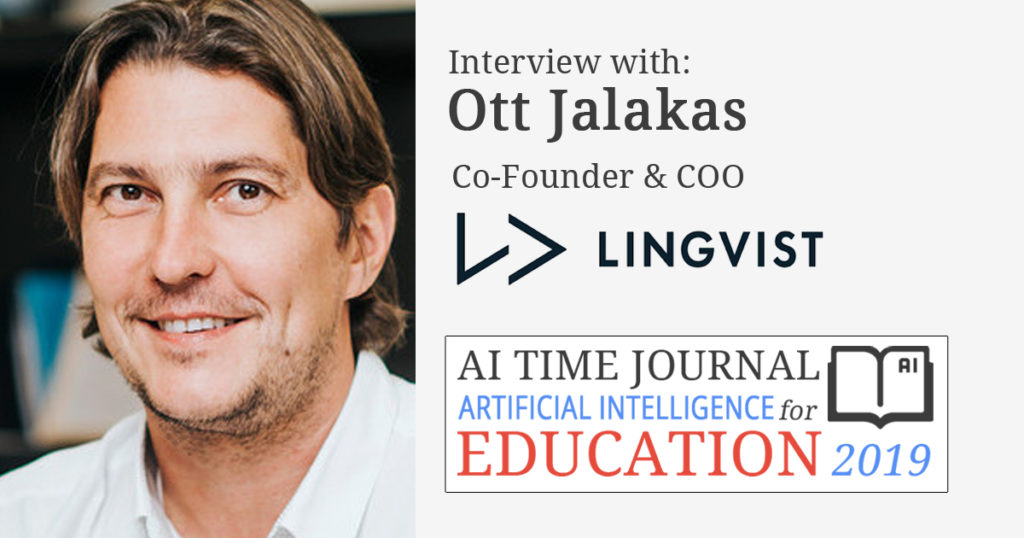
Ott Jalakas is the Co-Founder and COO of Lingvist, a company that focuses on building a technology-driven, personally adaptive and mathematically optimised way of learning a new language.
In this interview, Mr. Jalakas shares insights on how technologies such as adaptive learning will have a huge impact on education by enabling teachers to optimise their lessons and reach every student’s needs.
This interview has been
featured in the AI for Education Initiative 2019.

What is your background and how was Lingvist started?
My background is in the investment banking and financial markets, where I spent 15 years working in several countries for Scandinavian banks and investors.
Our co-founder Mait developed the platform when he was working as a scientist at CERN. He had lived in Switzerland for a few years and hadn’t managed to acquire French. He wanted to learn the language fast, so he developed a prototype of Lingvist which helped him pass an exam after studying for months when most people had to study for years.
Our mission is to help humans learn faster, as we believe this will be a huge advantage in the future. We believe the world would be a better place if our capacity to learn increased. We build and utilize AI to achieve that.
What are the major challenges in language learning today? How can AI technology help solve or mitigate them?
Traditional language learning tends to be hard work, impersonal, and very time consuming. We personalize your learning – you learn exactly what you need to learn and in the way that is most efficient for you to minimize the time. Thus, if you accept the challenge and are willing to do the hard work, Lingvist makes it personal and less time consuming.
We employ applied AI to personalize the content you learn and machine learning methods to minimize the time and your personalized learning process. AI and algorithms help to scale personalized learning and make it accessible to those who might otherwise miss this opportunity due to constraints such as time, place, access, money, etc.
What are the major opportunities brought by AI in language learning and education at large today?
Scalable personalization is by far the most important benefit of employing AI in education, including language learning. Increasing access to AI-empowered learning and making people aware of the fact that these kinds of novel tools are available to everyone will change the world. Continued lifelong learning is a new norm, and increasing accessibility to smart tools to boost learning is delivering results for humankind.
How can teachers prepare for AI-powered education?
Teachers are becoming private tutors. We still need teachers, their skill sets and experience, but AI-powered education enables replacement of mass production and standardization of in-class education – things that consume the majority of teachers’ time – with computer-assisted learning. And this enables teachers to tailor their teaching to individual students, their specific needs and opportunities.
If you believe that the ultimate goal for NLP is to make machines effective teachers of languages, then their current limitations are quite clear.
Which AI technology do you think will have the biggest impact in education in the coming years and why?
I’m a huge fan of adaptive learning and employing NLP. This is probably because these tools are very powerful and utilized in Lingvist’s product today. Education and the ecosystem are very difficult to change; they have high inertia. I might say the educational ecosystem and its agents are fighting any change. That is why I believe adaptive learning and employing NLP methods, which both are relatively down-to-earth tools, have the highest probability to succeed and have the biggest impact.
How should educational system management software adapt to the advent of AI?
The educational ecosystem has extremely high inertia and tends to fight any change. It needs to open up and accept changes. The change and search for more efficient and effective learning tools is unavoidable in the context of lifelong learning and the accelerating rate of change in today’s world.
AI will be the central and most important building block for increased efficiency and improved focus of learning, with principles of lifelong learning generally having been accepted as an unavoidable paradigm.
What are the current technological limitations of NLP which, once overcome, could bring massive improvements to language learning?
If you believe that the ultimate goal for NLP is to make machines effective teachers of languages, then their current limitations are quite clear.
Despite all the progress in NLP, a computer’s knowledge of a language is not grounded in real experience – it’s still somewhat abstract. I believe the lack of grounding in the social, cultural, and perceptual nuances of everyday experience poses a big problem for applications of NLP in language learning.
Just as a teacher can’t teach things that she doesn’t understand herself, machines are not able to convey these important aspects to language learners. What makes this especially important is the fact that a big part of language learning is learning how to accomplish things in the real world with a language, rather than memorizing some vocabulary or grammatical structures.
Consider learning to flirt: a machine can’t really teach you to flirt because it misses many elusive aspects and nuances of this process. Engaging in negotiations is another example of something that happens mostly through language but cannot be really understood and learned outside the entire cultural and social context.
Of course, these are problems that are quite deep, and it doesn’t seem that they will be solved in the very near future. In a way, you would almost need a general AI to really make a human teacher unnecessary.
And, of course, all of this doesn’t mean that NLP cannot be a huge help in language learning for learners themselves or provide very effective assistance to human language teachers.
Where do you see AI for education in the next 5–10 years?
AI will be the central and most important building block for increased efficiency and improved focus of learning, with principles of lifelong learning generally having been accepted as an unavoidable paradigm.
I see things in very positive tones, with improved accessibility and affordability, combined with applications of AI and computing power that are made to benefit humanity, providing huge, positive contributions.
How do you find the Estonian start-up ecosystem, particularly in the AI space?
The Estonian startup ecosystem is very energetic and positively thrilling in general, but especially in the AI space. A large number of startups have fantastic ideas about employing AI and data science in different fields. It is difficult to say the actual number and the level of activities, as most of the projects and startups are at an early stage and keep a rather low profile. Still, a number of hugely successful technology companies are benefiting from applying AI tools. To name just a few, there is Bolt in transportation and logistics, Veriff and Realeyes in visual recognition and the applications space, and obviously Lingvist, which is taking language learning to the next level.
